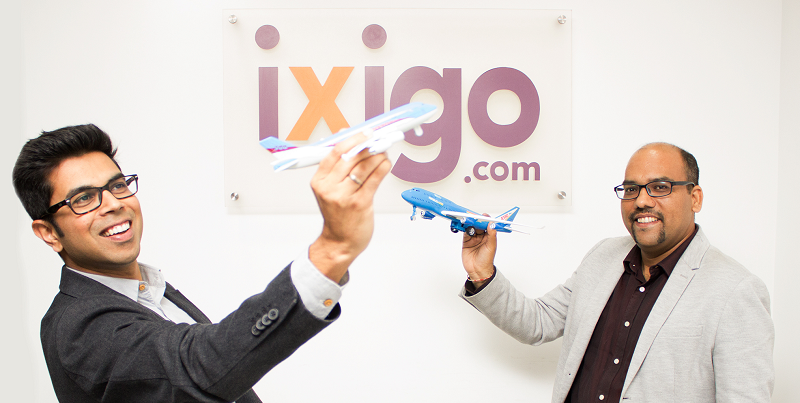Startup
IXIGO posts 26% revenue growth in Q2 FY25, PAT down 51% due to tax impact

Le Travenues Technology Limited, the parent company of , reported a 25.96% year-on-year increase in operating revenue from operations for the second quarter of FY25.
However, profit after tax (PAT) slumped by 51.01% YoY to Rs 13.08 crore, down from Rs 26.7 crore in the same period a year earlier, largely due to increased tax expenses and other adjustments.
During the half-year ended September 30, 2024, the company completed its initial public offering (IPO) and incurred Rs 471.38 crore in related expenses, with Rs 73.29 crore worth of such expenses allocated to the company. Of this, Rs 61.61 crore was adjusted against the securities premium.
Revenue surged to Rs 206.47 crore in Q2 FY25, compared with Rs 163.91 crore earned in the same quarter last year. Total income followed suit, rising by 26.98% YoY to Rs 210.91 crore, up from Rs 166.09 crore in Q2 FY24.
Total expenditures increased by 13.43% year-over-year, reaching Rs 191.46 crore in Q2 FY25, compared with Rs 168.8 crore in Q2 FY24.
Train bookings remained IXIGO’s largest revenue driver, contributing Rs 110.43 crore in Q2 FY25, accounting for nearly half of the company’s transport booking revenues. This marks a 19.6% growth from Rs 92.3 crore in the same period last year.
Flight bookings, IXIGO’s second-largest revenue source, saw a more significant surge, growing by 42.16% to Rs 55.8 crore in Q2 FY25, up from Rs 39.25 crore in the year-ago period.
Startup
Magenta Mobility’s FY24 revenue rises three fold, losses widen by 17.1%

Magenta Mobility on Thursday reported a 199.5% jump in its full-year revenue to Rs 35.53 crore compared to Rs 11.86 crore in the previous year helped by a significant rise in its revenue from services.
The company provides a 100% electric fleet and AI and IoT-enabled fleet management and data analytics platform to optimise logistics operations and deliveries. Revenue from these services for the year ended March 31, 2024, increased to Rs 30.17 crore compared to Rs 10.15 crore in FY23.
However, the company reported a 17.1% increase in its loss for the period to Rs 46.44 crore as opposed to Rs 39.66 crore in FY23, bogged down by rising expenses during the year. The 109.1% rise in expenses to Rs 90.17 crore was primarily due to rising driver costs, employee benefit expenses, and finance costs.
Magenta Mobility appoints drivers on a contract basis to provide services to its customers, which it accounts as an expense. The drivers’ cost for FY24 increased to Rs 18.49 crore, compared to Rs 6.34 crore in FY23.
The rise in demand for the company’s fleet comes amidst a boom in the last-mile delivery sector in India owing to the rise of ecommerce and quick commerce players. Magenta Mobility caters to clients such as Flipkart and hyper-local delivery platform Dunzo, among others.
Founded in 2017 by Maxson Lewis and Darryl Dias, the company last raised $22 million in a Series A funding round from BP Venture and Morgan Stanley India Infrastructure-managed investment fund.
Startup
Juspay cuts losses by 7.7% as revenue surges 49.6% in FY24

Payments startup Juspay Technologies saw its losses narrowing in FY24 as revenue growth outpaced expenditure. It narrowed its total loss for the period to Rs 97.54 crore, down 7.76% from Rs 105.75 crore in FY23.
According to the consolidated financial statements accessed from the Registrar of Companies, the SoftBank-backed fintech firm’s revenue from operations surged 49.64% to Rs 319.32 crore, up from Rs 213.39 crore in FY23.
Juspay’s primary revenue source—payment platform integration fees—brought in Rs 286.52 crore. Additional operating revenue from services like product implementation and support added Rs 32.80 crore.
Total expenses rose by 29.52% to Rs 443.74 crore in FY24, compared to Rs 342.59 crore in the previous year. This increase was largely driven by employee benefit expenses, which saw a 41.73% jump to Rs 303.36 crore, while other expenses increased slightly over 3.56% to Rs 123.76 crore.
Juspay, founded in 2012 by Vimal Kumar and Ramanathan RV in Bengaluru, specialises in developing payment orchestration solutions that act as a technology layer over traditional payment gateways.
The Accel-backed startup has also developed Namma Yatri, a mobility app focusing on ride-hailing services, leveraging Juspay’s strengths in payments and open-source protocols. Namma Yatri is built on the Beckn Protocol and aligns with the Open Network for Digital Commerce (ONDC), aiming to provide low-cost ride-hailing options and open access to digital mobility services.
Recently, Juspay decided to spin off Namma Yatri as an independent entity to attract separate investors and scale further. In February, the company said it acquired LotusPay in an all-cash deal to strengthen its offerings to the BFSI segment and merchants.
LotusPay, founded in 2016, pioneered NACH Debit technology with cloud-based software for merchants and banks. Using NPCI’s NACH Debit, it facilitates recurring payments for loans, insurance, and subscriptions.
Startup
Flipkart selects five startups for third cohort of Flipkart Leap Innovation Network

has selected five innovative startups for the third cohort of its flagship startup accelerator programme, Flipkart Leap Innovation Network (FLIN).
The cohort is introducing startups that are driving advancements across GenAI, omnichannel, analytics, and video commerce, the company said in a statement.
The selected startups— Intelligence Node, Invenzo Labs, StoryBrain, Phyllo, and D-ID— are set to run pilot programs with Flipkart to develop solutions.
“The selected startups get access to mentorship, resources, and the opportunity to execute pilot projects within the Flipkart ecosystem, scaling their solutions to meet the demands of India’s digital economy and e-commerce growth,” the company said.
Since its launch in 2022, the accelerator programme aims to accelerate the growth of the startup ecosystem in India, driving collaboration, and championing cutting-edge retail innovations.
“Through the FLIN programme, Flipkart continues to expand its role as a catalyst for innovation within India’s startup ecosystem, providing a collaborative platform for startups to test, refine, and deploy solutions that can shape the future of e-commerce in India,” said Naren Ravula, Vice President and Head – Product Strategy and Flipkart Labs.
The programme is designed to engage with startups through commercial partnerships in Flipkart’s areas of interest. Successful startups get the opportunity to scale up to a business partnership.
Over 20 startups from the initial two cohorts have concluded pilots working closely with the Flipkart Product and Engineering teams.
The company added that four startups from the previous cohort— Anagog, Speedsize, Sangti, and Vtion— have recently concluded successful pilot projects with Flipkart.
-

 Startup Stories1 year ago
Startup Stories1 year agoWhy Millennials, GenZs Are Riding The Investment Tech Wave In India
-

 Startup Stories1 year ago
Startup Stories1 year agoStartups That Caught Our Eyes In September 2023
-

 Startup Stories1 year ago
Startup Stories1 year agoHow Raaho Is Using Tech To Transform India’s Fragmented Commercial Trucking
-

 Startup Stories12 months ago
Startup Stories12 months agoMeet The 10 Indian Startup Gems In The Indian Jewellery Industry’s Crown
-

 Crptocurrency8 months ago
Crptocurrency8 months agoLither is Making Crypto Safe, Fun, and Profitable for Everyone!
-

 Startup Stories1 year ago
Startup Stories1 year agoHow Volt Money Is Unlocking The Value Of Mutual Funds With Secured Lending
-

 Startup Stories1 year ago
Startup Stories1 year agoWhy Moscow-Based Kladana Considers Indian SME Sector As The Next Big Market For Cloud Computing
-

 E-commerce1 year ago
E-commerce1 year agoTop Online Couponing Trends To Watch Out For In 2016




